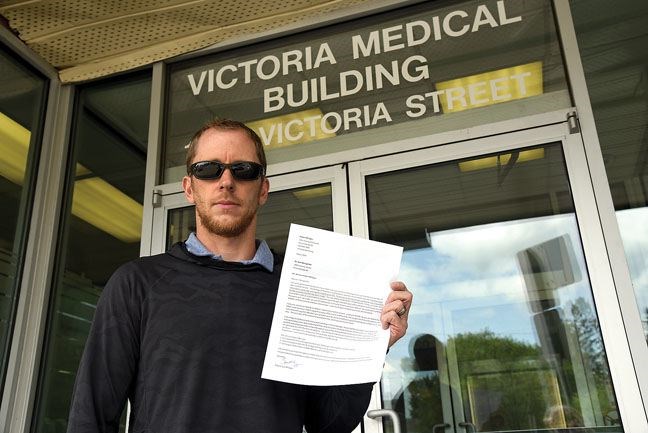A Prince George man is complaining to B.C.'s physician oversight agency after he said a local doctor refused to release his father's medical records before he paid a transfer fee.
While the College of Physicians and Surgeons of B.C. guidelines say billing is acceptable when people change doctors, the transfer shouldn't be contingent on receiving payment.
"I see your actions as holding my father's health records for ransom - a ransom of $40," wrote Robert Sam Milligan in a letter he brought to the Prince George doctor Wednesday, with the payment.
He'd first been to Dr. Kim Weisgerber's Victoria Street office Monday, a little over a week after Milligan's 72-year-old diabetic father had a severe low at a Vanderhoof Tim Hortons and was sent to St. John Hospital.
Milligan's father couldn't make it out to Prince George to pay the chart fee before a Thursday appointment with the new doctor in Vanderhoof - where he'd just moved - and the office still wouldn't release the records without payment.
Milligan came back from a trip to an angry call from his sister. Milligan, a nurse for 16 years, sees the approach as compromising the continuity of care.
Milligan was quick to praise the many doctors who transfer patient records without prior payment but this example literally hit close to home.
"It's not about the $40," said Milligan. "We shouldn't be putting our financial interests in front of the care of the clients."
Weisgerber did not respond to requests for comment Wednesday and Thursday.
Milligan has never spoken with Weisgerber but said after he showed the college's rules to the office, offering to pay after the records were sent, the office called the next day to say "that's the way his office does things."
Milligan told Weisgerber in the letter he's hesitant to proceed because his father always regarded the doctor as "a good guy."
His father spoke with Weisgerber and relayed that "the reason (Weisgerber) has this up-front billing is because in the past he has sent enough charts away and no one pays him."
"I can see that argument from Dr. Weisgerber but it's still against the law, it's still against his professional body," Milligan said.
In an email, the college said if patients are concerned about timely transfer of records or the conduct of physicians, they should contact the college.
"It is appropriate for physicians to bill patients privately for transferring copies of their medical records; however, transfer of medical records to another treating physicians should be done promptly and should never be delayed pending payment," said Susan Prins, communications director.
Ontario's college has a similar rule and the Canadian Medical Protective Association, a not-for-profit organization providing medical liability protection for more than 92,000 doctors, said "physicians may charge patients a reasonable fee for copying the record," but noted only some colleges have guidelines for the transfer.
Milligan would like to see this become more of a conversation at the provincial level.
"Me writing this letter is just the tip of an iceberg of the systemic issues that we've allowed physicians to build," he said.
He would repeatedly confront that approach when he worked as a nurse with the Central Interior Native Health Society for five years until 2013.
"In there I worked with a very marginalized section of the clients," he said. Many came from different communities across the north, from Dawson Creek to Prince Rupert.
"They would come in and we would have to get their medical records. There was a pretty even split of physicians that would respect the fact that these people couldn't pay... to the physicians that would not forward the record."
When he called to advocate for clients, and pointed to the college's rules, "it didn't sway anyone."
At the time he never made official complaints because of the fear that a story about one doctor would taint an entire clinic.
"I've seen this time in and time out...(people) unable or cannot afford the transfer fee," he said.
"But this is my father."
In his letter, he writes "the principle of this action hit a chord with me and I cannot remain silent." Over the phone, he says the actions he's witnessed by many physicians over the years is a failure to adhere to the Hippocratic Oath.
"It's hard to have those conversations because of the power imbalance," he said. "It's a conversation that needs to start."
Correction: A previous version of this article referred to the Canadian Medical Protective Association as a national body for physican colleges when it is a not-for-profit organization providing medical liability protection for more than 92,000 doctors.



